december-top.html
1867 A barrow full of gunpowder was placed at the wall of Clerkenwell Gaol in London on this day in 1867. The explosion was intended to destroy the prison wall and enable the escape of Fenian inmates, most notably the arms dealer Richard Burke.
However, the explosion was far bigger than anticipated. It not only destroyed the prison wall, but also several nearby houses. The damage was colossal, and 12 people were killed and another 50 seriously injured.
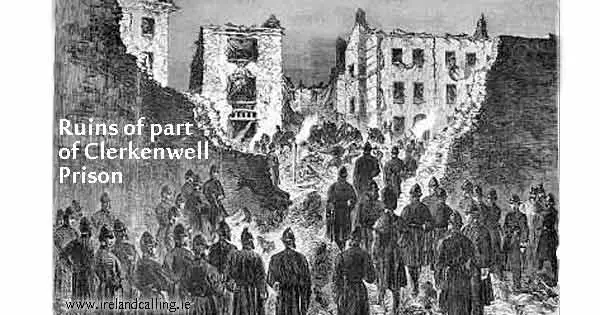
Burke did not manage to escape, as the hole in the wall was blocked before he could gain access to it. An Irishman living in London named Michael Barrett was accused of the crime and arrested for multiple murders.
He pleaded his innocence in court, and called a witness who could place him in Scotland at the time of the attack. The prosecution’s case rested on the evidence of Patrick Mullany, a Dublin criminal who had given false testimony, and had made a deal for a free passage to Australia. He claimed Barrett had told him he had tried to rescue Fenians from the gaol.
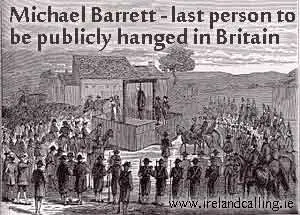 The court found Barrett guilty and he was sentenced to death. He was the last person to be publicly hanged in Britain.
The court found Barrett guilty and he was sentenced to death. He was the last person to be publicly hanged in Britain.
The deaths of the innocent people in the homes surrounding the prison changed the public opinion in Britain.
There had been a certain level of sympathy towards the Irish struggle in the years that followed the ‘Great Famine’.
However, the deaths of innocent Britons in the name of the Irish cause was not well received, and Barrett died listening to an angry crowd booing and singing Rule Britannia.
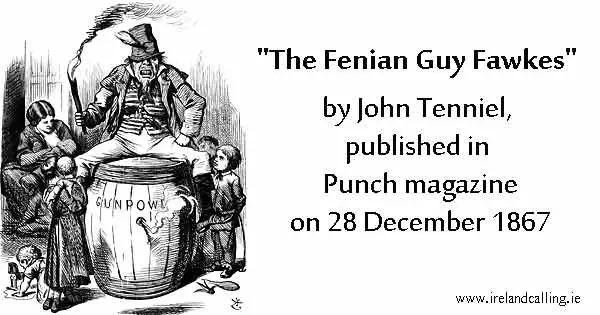
* * *
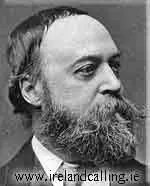 1891 William Gorman Wills died on this day in 1891. He was a dramatist, novelist and painter from Kilkenny. He spent his entire career in the arts, but almost always drew criticism for his works.
1891 William Gorman Wills died on this day in 1891. He was a dramatist, novelist and painter from Kilkenny. He spent his entire career in the arts, but almost always drew criticism for his works.
Wills wrote and illustrated his first two novels, Old Times and The Wife’s Evidence. They were met with mixed reviews. He moved to London and tried to make a career as an artist instead. He had undoubted talent, but his lack of professional training and his disorganised approach led to him to struggle to find work.
Wills found his true calling in theatre productions. He directed numerous plays in both London and New York. Many of them were based on true stories, and it was Wills’ interpretation and portrayal of many of these events that attracted more criticism. He was often accused of altering the facts of a historical events in order to create more interest in his productions.
Wills also wrote several more novels throughout his lifetime, but very few are still in circulation today.
Click here to read about more Irish writers
* * *
1913 JB Malone was born in Leeds, England on this day in 1913. He moved to Ireland at 18, and soon joined the Irish Army. When on leave, he would explore the mountains of his home County Wicklow. Once he had left the army, he proposed an idea of guided hill walking tours, for visitors to the county. Malone recognised the importance of tourists having an experienced walker accompanying them in the hills, both for safety and local knowledge.
He proposed the idea of Wicklow Way in 1966, a recognised walking trail for visitors and locals to enjoy. Malone liaised and negotiated with all the necessary landowners and farmers to make his vision a reality. The Wicklow Way is now walked and enjoyed by thousands of people each year.
Malone became a familiar face in Ireland from the 1960s when he presented a television programme showcasing the views and experience of walking in the Wicklow hills.
After his death, a stone plaque was erected on a part of the walking trail, overlooking Lough Tay.

* * *
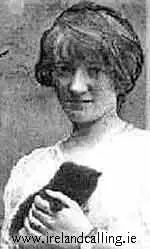 1955 Grace Gifford died on this day in 1955. She was an Irish republican and cartoonist, who illustrated many nationalist publications in the early 20th century.
1955 Grace Gifford died on this day in 1955. She was an Irish republican and cartoonist, who illustrated many nationalist publications in the early 20th century.
Gifford was deeply involved in the Irish Volunteers movement in the build-up to the Easter Rising in 1916. Her fiancé, Joseph Plunkett, was one of the rebel leaders.
When he was sentenced to death for his part in the Rising, Gifford went out and bought a ring immediately. The two were married in Kilmainham Gaol, just hours before Plunkett was executed.
Click here to read more about Joseph Plunkett and Grace Gifford
Click here to read more about the Easter Rising
Click here to read more Irish love stories
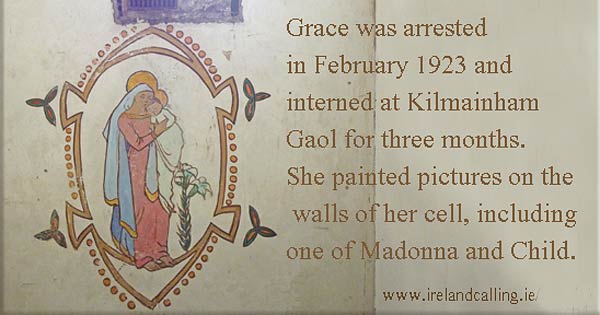
* * *
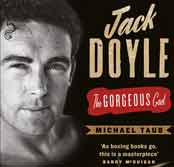 1978 Jack Doyle died on this day in London in 1978. He was an Irish former boxer, film star and tenor. Doyle was born in Cork and developed a reputation as a powerful boxer in the British Army. He was signed up as a professional and had several successful years in England and America. On occasions his taste for the bottle got him into trouble, with some fights being over before they started when Doyle turned up drunk. However, his fierce punching power meant he continued to draw big crowds.
1978 Jack Doyle died on this day in London in 1978. He was an Irish former boxer, film star and tenor. Doyle was born in Cork and developed a reputation as a powerful boxer in the British Army. He was signed up as a professional and had several successful years in England and America. On occasions his taste for the bottle got him into trouble, with some fights being over before they started when Doyle turned up drunk. However, his fierce punching power meant he continued to draw big crowds.
He travelled to America and enjoyed a career as a singer as well as a boxer. His fame got him parts in Hollywood films and his riches and charm attracted the most beautiful women around. Doyle married the actress Movita Castaneda.
Their marriage was short-lived unfortunately, as Movita grew tired of Doyle’s lack of responsibility and care-free lifestyle. She left him in Ireland after he lost another boxing match having drank a bottle of whiskey before the first bell. Movita went on to marry Marlon Brando.
Doyle’s life went downhill after that, his money had run out and as is normally the case, so had his friends. He served a short time in prison for writing a dodgy cheque, and lived out the remainder of his life in poverty. When he died, the Cork Boxing Association raised the money for his remains to be returned to his hometown so that he could receive a proper burial.
Towards the end of his life Doyle admitted he had squandered his fortune on “slow horses and fast women”. When asked if he had any regrets he replied: “None at all, ‘twas never a generous man went to hell.”
Irish songwriter Jimmy McCarthy wrote The Contender as a tribute to Doyle’s life. Here is a YouTube video of the brilliant Christy Moore performing the song.
Click here to read about more Irish sports stars
Click here to watch more Christy Moore videos
* * *
2002 Evelyn, a film about the true story of Desmond Doyle fighting to be re-united with his children, hit US cinema screens on this day in 2002. Pierce Brosnan played the lead role, as an Irish father in the 1950s who had his children taken away from him by the authorities after their mother left home.
Irish law at the time, stipulated that children couldn’t be brought up in a ‘broken home’. Doyle enlisted the help of his friends and lawyers to take the case to the Irish Supreme Court and challenged the validity of the law. The Supreme Court ruled in favour of Doyle, and the children were returned to him. All his court costs were to be paid by the government.
Click here to read more about Pierce Brosnan
Click here to read about more Irish actors
december-bottom.html